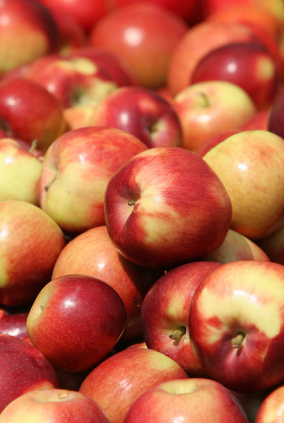Concerned about pesticides on your produce? You’re not alone! Buying organic fruits and vegetables is a great way to limit pesticides in your body. However, cost and/or availability can be a barrier to eating 100% organic. Here are some facts that will help when you’re faced with the choice of conventional (non-organic) or organic.
Three Simple Tips to Limit Pesticides From Produce
1. Remember that eating conventional produce is still better for you than not eating it at all. Fruits and vegetables are an important part of a balanced diet and should be consumed daily.
2. Whether you shop completely organic for your home or not, you don’t always have control over the choices when you are out and about. This is when it’s helpful to know which conventional produce is considered “cleaner” than others.
Use this helpful guide! The Environmental Working Group’s Shopper’s Guide to Pesticides in Produce has recently updated information on 45 popular fruits and vegetables and their total pesticide loads. This guide can help you choose from what’s available in your local market.
Highlights from the Environmental Working Group’s Shopper’s Guide to Pesticides in Produce:
The Dirty Dozen are the highest offenders in conventional produce per the EWG.
Here they are:
apples
celery
sweet bell peppers
peaches
strawberries
nectarines, imported
grapes
spinach
lettuce
cucumbers
blueberries, domestic
potatoes
Good news! These yummy 15 were found to be the cleanest!
onions
sweet corn
pineapples
avocado
cabbage
sweet peas
asparagus
mangos
eggplant
kiwi
cantaloupe, domestic
sweet potatoes
grapefruit
watermelon
mushrooms
See any of your favorites on the dirty list? You may want to consider switching anything considered high in pesticide loads to organic — or ask your local produce provider how the produce was grown. Some smaller growers will go pesticide free without applying for an expensive organic label in order to keep the cost of the food down. For access to the complete “Shopper’s Guide,” go to the EWG website.
3. Another option is to use a wash for fruits and vegetables to remove residue. These washes can be found in most grocery stores.
Good Reasons to Limit Pesticides
While it’s impossible to get through life without being exposed to toxins from time to time, my gut says it’s a good idea to avoid them as much as possible. Current research is linking certain pesticide residues to cancer and damage to the nervous system in humans. I think it’s important to keep these studies in mind when developing your healthy eating plan.
Have a question or something you’d like to share? Please leave a comment below. I enjoy hearing from you.
To your health!
Jennifer






